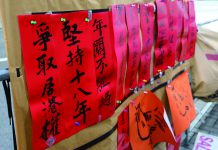Fung Long-hei, the 1997-born Hong Kong football team supporter, is one those who refuses to join the vigil, because he thinks it is useless to demonstrate every year as nothing can be achieved. Fung, who is a social work student, is a former member of Scholarism, the student organisation that led the protest against government plans to introduce compulsory national education in schools in 2012. Like many of his peers, Fung has embraced a local Hong Kong identity and is firmly against any further integration with the Mainland.
Fung is dissatisfied with what he sees as increasing interference from Beijing and its tightening control over Hong Kong’s politics and economy. He sees separation rather than negotiation as the solution to gaining greater freedom. “The situation is like, I have no relationship with this person, but I have to listen to him and be his son. Honestly, it makes me somewhat resentful,” Fung says.
Brian Fong, the Education University professor, is unsurprised that young people have a negative view of China.
“The things you experience when you’re growing up in your teens and into your twenties influence you the most,” he says. “For this generation, it might be the anti-express rail movement, anti-national education, the Umbrella Movement and the National People’s Congress 831 framework, the [Legislative Council] oath-taking controversy. All these interfere with our autonomy and undermine one country two systems,” he says.
Ma Ngok, an associate professor from the Department of Government and Public Administration at the Chinese University of Hong Kong (CUHK), agrees with Fong that there are generational factors behind the changing sentiments towards mainland China among people of different ages. He says people born in the 1960s still lean towards nationalism, and that influence passes onto their children. “The older generation are more aware that they are Chinese, so they tend to think the happenings in China are somehow related to them.” Ma says.
The influence of national identity fades with the younger generation born after 1997. “Hongkonger” has become a separate identity. Since more people are preferring to assert their Hong Kong identity over a Chinese identity in recent years, Ma concludes that China’s efforts to win Hong Kong people’s hearts has been a failure.
“Before 2008, I guess many people would still talk about the huge economic benefits Hong Kong would receive after integration,” Ma says. “But after the financial crisis in 2008, many found out the benefits for the city were not as huge as predicted.”
Taking into consideration the increasing political control, the more negative side of greater economic integration and competition over baby formula, hospital beds and school places, more Hong Kong people are finding it difficult to accept further integration.
Looking to the future, Ma predicts greater deterioration of relations that will continue to tear Hong Kong and mainland China apart. “All these [tensions] build up and Hong Kong people will find themselves walking further away from mainland China.”
Edited by Avery Tsui









































